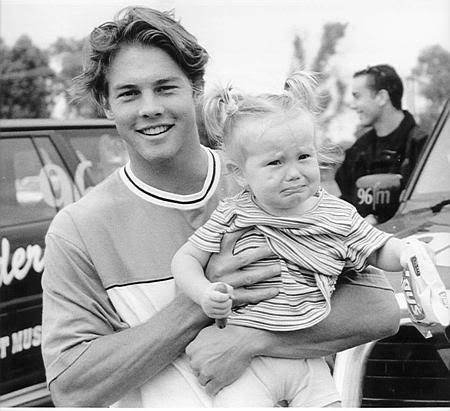
If we climb too high, I won’t see you by the light
Public relations gurus who sweep into the industry – usually with breathless hype from other countries and posters with reviews to put on the wall – will always start their talks talking about the notion of self management, particularly when it comes to rehabilitating a falling star or a troubled client. Own it they will say, get the client up front, talking about it, admitting culpability. Crisis management, it’s so important, it’ll make them seem human. They usually talk this up as a wonderful catch all solution, complete with a flip chart.
It’s a reckless one size fits all approach to public relations. What if the client simply can’t cope in an interview environment? What if your client is exposed to an interview that’s too soft (like James Hird with Tracey Holmes) or an interview that’s a disaster (like Don Burke). In the age of a snark filled social media, you can own anything you want, but what if no one believes you? This isn’t new of course: the power of television has sunk people since it’s invention. A PR agency that puts a client under a spotlight when they aren’t ready is not going to last long in the game.
There is an alternative path to putting your client through a grilling at the hands of a Grimshaw or a Frost, but it is dependent on your clients relationships, and it’s not as easy at it once was in the justly empowered age, where the voice of the voiceless is being heard. That strategy? Lets other speak for you.
Personal brand management not working? Let your “mates” do it for you. This is particularly important in Australia, where mateship and the “good bloke” card gets you to open certain doors. A Premiership medal? A Brownlow? A clutch of good stories about Barassi shouting at you in the 70s? Come in mate, the doors never closed…
The traditional approach to PR was to rely on support from media and community. In the era of communications managers full of self import, things are a little more complicated than simply buttering up the chief writer of the Herald Sun with wine and steak. Communications managers are just as likely to ring or text a sympathetic team-mate or ex team-mate in the media than they are prepare a puff piece with the Herald Sun. Feature articles aren’t as important as getting the right quote. It’s a soundbite era, attention spans are low. Get the quote, not the article….
The weird thing, the behind the scenes issue with that is that when you do text that person, someone who hates that person is ready with the counterpoint (not just the client you trying to manage, but the person you’ve just texted). For all the part of the boys club that helps, there’s someone willing to oppose. And it’s purely for content, but that’s another story…
It’s important to note that football clubs aren’t always the most supportive environment, as an entity. They espouse team then push someone under the bus for individual responsibility when it suits them. The boys club doesn’t have to relate to support from the club that employs the player: for how many old/retiring players does the end come in a bitter or uncomfortable way.
The relationship between club and player is mis-understood sometimes as the be all and end all of the boys club, but its wider than that. It’s a “fraternity”, it’s a football family, it’s local footy clubs booking you for a speaking engagement when no one else will. Football clubs are paternal until they aren’t, until they don’t need to be….the boys club of ex players is footballs ultimate expression of team…
There are a lot of people who draw comfort and positives from the encircling of the boys club: my issue with it isn’t rallying around old Fred the bootstudder to buy him a lawn-mower in his old age. It’s that it alters perceptions, it allows indiscretions to be forgotten. Sure, it makes PR easy to manage, as we’ll discuss soon. But the extension of it is Wayne Carey hosting White Ribbon night because “he’s a good bloke” and “Oh Duck! Tell us about the State Game again!” – in a week where Ben Cousins began the road to rehabilitation after a jail sentence for stalking, and where “ex team-mates” were concerned for Bomber Thompson, it’s worth discussing again the boys club and the role it plays in PR.
Of course, this isn’t just a Cousins issue. We’ve spoken on the blog about the rehabilitation of Wayne Carey (spoiler, we weren’t a fan) being pretty much orchestrated through a carefully choreographed episode of Eddie McGuire Tonight which two minutes in featured McGuire waving his hand at the camera and saying they weren’t there to talk about the past. Footballers stick together, they have a powerful collective voice that chooses narrative as it’s guiding light. Good blokes and flogs. Returned favours from long ago get repaid. They help each other pick up, they appear at each others charity functions or speak at their footy nights. And they speak up when times are tough, to a point, because the favour is usually repaid.
That is, with one notable exception – not being a “good bloke”. Jason Akermanis was genuinely shunned and shut out during the Demetriou era seemingly because he was, to put it politely, not a “good bloke”. No actual crimes, just not of the mould, not one of them. Heritier Lumumba anyone? If you don’t laugh at the right jokes, it’s done.
What will be interesting will be the “next generation” of media personalities, this generation of old players, and how their sensibilities play out. The McGuire-Newman-Brayshaw-Careys are still clinging on to the old ways, the old relationships, the old handshakes, but it’s fracturing slightly among low ratings and itchy feet. But the boys club is still there: for better or worse…
It’s time for a few small repairs
For all the storm and froth and bubble and narrative of the weekly 360s and Couches and Herald Suns, very few footballers fall genuinely by the wayside or are genuinely shunned by the game, the “family”. Depending on your viewpoint this is either a wonderful compassionate olive branch formed through the relationship a man can only truly feel kicking a piece of leather to another man or providing a drink card in a time of need, or some of sort destructive boys club that encourages the fallen and forgives actual crimes.
Both can be true of course: it’s possible to strongly argue that Ben Cousins getting a job from West Coast is a charitable act from a club that played a gigantic part in his problems, while at the same time being deflated and distressed that someone convicted of stalking his girlfriend walks into a job and a support network on day one of his release from jail, replete with the media trying to find amusing angles to a serious conviction.
You can also throw in the Bomber Thompson guessing game that took place this week, which featured dramatic sky cam of Bombers house being raided that led to his arrest, that led to him being released without bail that led to him being pictured on a bike with “footy great” being the tagline because no one knew what was going on, while Danny Frawley was already circling the wagons of support.
It was a complete media cycle of PR rehab kicking in before we even knew what the charges were. It sets the template nicely for the medias full transition to Twitter guessing game. Make things interesting remember…
Back to Cousins though: it was universally distressing that News.Com decided to continue their new-found game of “I know this bloke stalked his girlfriend but lets lighten the mood!” by pointing out rather helpfully that Cousins had a long beard that’d he need to trim off if he wanted that job at West Coast! Of course, this followed on from their side splitter about Colin Sylvia being like Spiderman when he stalked his girlfriend (complete with helpful diagram).
What’s interesting about this is the line between (ahem) journalism and PR pieces. Adding levity to such a serious situation is such a strange thing to do, it almost feels deliberate. Let’s just say News.Com know their audience, and their “give him a go!” sense of proportion….not to get too deep into it, but the ideological bent of the Herald Sun or News.Com is of course socially conservative, which explains a lot of the editorial decisions in the Sylvia and Cousins coverage…
That may be over thinking things, with the cynicism of PR being applied. In truth, Cousins beard being of length (like Ned Kelly!) is part of what Steve Kerr talked about the media doing with Lavar Ball, searching for entertainment, saying “Can we make it really interesting for no apparent reason?’ – Cousins is a content creator, someone to follow, and a shot of him emerging from jail isn’t quite enough. Can we make it really interesting for no apparent reason? Let’s start with his beard, then can we photo him clean-shaven, then we can talk to an ex team-mate and…it’s a merry-go-round.
The key driver of all this is culture: the culture of adulation around sports stars and the culture of support that is around them. That culture of adulation is fairly simple: any current player can redeem the most heinous of moments by kicking a ball around well. Past players can rely on their relationships with their team-mates to help out even if it has ended badly with the club.
The storm clouds to all of this will be if a #metoo moment happens in AFL: that’s the interesting part. Where does the boys club go when an AFL player (and it will happen) gets named and shamed – do they distance, ostracize or go to the same strategy as always. The full impact of #metoo is yet to play out, but it’s holding men to account. When it comes to the AFL, it could be a seminal moment…
You’re riding on a carousel that’s going nowhere round and round
To tie back to our original point though and conclude, simplicity can often be the key to PR management of a fallen star. Not everyone is as brazen as a Sharapova, nor as steely focused in an interview situation. PR management is as much about what you shouldn’t do as what you should do. Sympathetic quotes from former team-mates can be just as effective in softening an image.
Even as erstwhile a figure as Gerard Whateley has thrown a few softball interviews and moments and sympathetic clucking towards his friends (Robbo and Mick Malthouse most notably). And something as simple as Ben Cousins walking onto the field to toss a coin at an Eagles game to a thunderous ovation is going to be simpler to manage than a grilling and a lecture from Mike Sheahan.
Football clubs want the PR of showing they care, of being a “family club”, of making Ben Cousins bobbleheads when the time is right. Football shows want the PR that comes from interviewing a fallen star, of “not talking about the past”, of humanizing a footballer in trouble lest it be them next time. It’s the media that drives the narrative of “the person needs to talk!” and social media that pulls apart our standard boiler plate PR apologies.
As we discussed, for better or worse, rehabilitating a fallen football/AFL star is about trusting the process. The best judgement anyone in PR can make is to trust timing. For all the talk of “formalised crisis plans” and “structured crisis management”, the structure of football is relatively simple.
Crisis communication plan? Not always needed – because the AFL media has chosen narrative over structure. Thus all things are equal, and all things shall pass. Criminal convictions are given the same flippancy as a team being 0-2, club crisis can be redeemed in a week with a “big win Gerard”…when the time is right, when the moment is right, and when your clients friends have spoken for them, it’s time to move….but not yet….
The lesson a lot of the time? Less is more…
Advertisements Share this:





